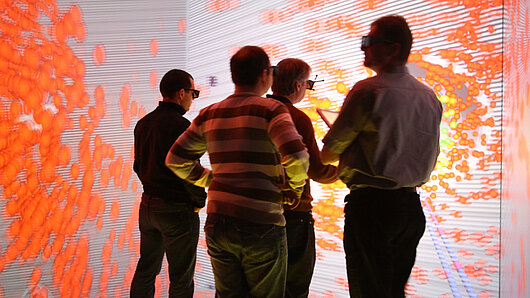High-Performance Computing Center Stuttgart

Oct 28, 2024
09:00
Oct 29, 2024
15:30
English
Dr.-Ing. Uwe Wössner (Head of Visualization), Martin Aumüller, and Dennis Grieger from HLRS.
All times are local times in the Central European Summer Time zone (Berlin).
First day (Monday, October 28):
08:30 - 9:00 Registration
09:00 - 12:30 Lectures and exercises
12:30 - 13:30 Lunch Break
13:30 - 17:30 Lectures and exercises
17:30 - 18:00 CAVE tour
Second day (Tuesday, October 29):
09:00 - 12:30 Lectures and exercises
12:30 - 13:30 Lunch Break
13:30 - 15:30 Lectures and exercises
Optional project-based exam after the course
Register via the button at the top of this page.
Registration closes on Thursday, October 3, 2024.
Late registration is still possible according to the course capacity.
Link to the EU and EU-associated (Horizon Europe), and PRACE countries.
Only participants from institutions belonging to these countries can take part in this course. The fee will be set to 0€
Our course fees include coffee breaks (in classroom courses only).
Besides the content of the training itself, an important aspect of this event is the scientific exchange among the participants. We try to facilitate such communication by
We plan to have lunch in the unversity's canteen (Mensa Stuttgart-Vaihingen, have a look at their menu online, paying by card only). Two other near possibilities for lunch are on all days:
We will update this information if opening times etc. change and inform you more precisely before the course starts.
Khatuna Kakhiani, phone 0711 685 65796, training(at)hlrs.de
HLRS is part of the Gauss Centre for Supercomputing (GCS), together with JSC in Jülich and LRZ in Garching near Munich. EuroCC@GCS is the German National Competence Centre (NCC) for High-Performance Computing. HLRS is also a member of the Baden-Württemberg initiative bwHPC. Since 2025, HLRS coordinates HammerHAI.
This course is provided within the framework of EuroCC2 and the bwHPC training program.
Within the scope of the EuroCC2 project this training is offered free of charge. By participating in a training free of charge, companies receive state-aid corresponding to the regular market-prices listed in the service portfolio. Please note state-aid regulations in Germany.
EuroCC 2 and EuroCC4SEE have received funding from the European High-Performance Computing Joint Undertaking (JU) under grant agreement No 101101903 and No 101191697. The JU receives support from the European Union’s Digital Europe Programme and Germany, Bulgaria, Austria, Croatia, Cyprus, Czech Republic, Denmark, Estonia, Finland, Greece, Hungary, Ireland, Italy, Lithuania, Latvia, Poland, Portugal, Romania, Slovenia, Spain, Sweden, France, Netherlands, Belgium, Luxembourg, Slovakia, Norway, Türkiye, Republic of North Macedonia, Iceland, Montenegro, Serbia, Bosnia and Herzegovina.


This course is partly realised in cooperation with the Centre of Excellence EXCELLERAT P2 (funded by the European Union, grant agreement No 101092621). See also the EXCELLERAT Service Portal for more information. This course is part of the EuroCC2 and CASTIEL2 "Training Sprint" initiative.
See the training overview and the Supercomputing Academy pages.
See also information about the HLRS training department and staff.
Aug 31 - Sep 01, 2026
Stuttgart
English
Sep 02 - 03, 2026
Stuttgart
English